You're Never Too Young to Learn Consent
Here are 5 practical tips for teaching little ones about consent you can use right now.
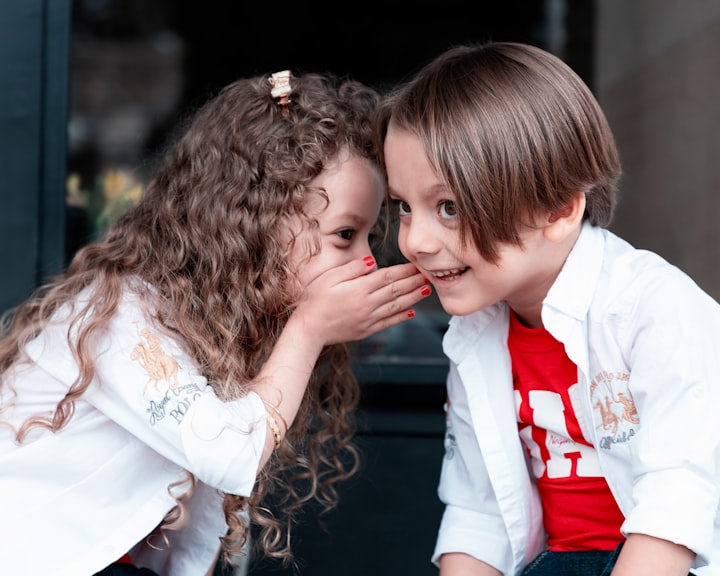
My 4-year-old with autism understands consent. There are grown people that still don't.
Let's change that.
Age and neurological differences can leave you wondering, "how do I even *begin* to broach these topics with my kid?"
Never fear, I've got you covered.
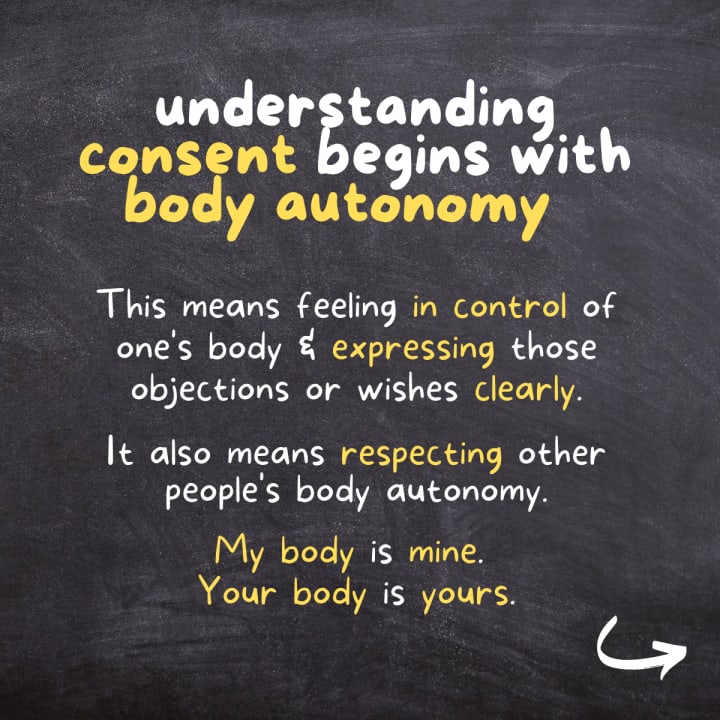
We've used this strategy with my nephew since he was born and at 4, he's now able to express verbally and with sign language/body language what he wants and doesn't want to happen with his body.
Not only that, but he LOVES his body, and is getting better and better at respecting other people's "nos".
(The other day I said "No, I don't want it" when he offered me a toy, and instead of forcing it in my face like he normally would, he said, "Oh, okay," and went about his merry way.)
It doesn't take much to teach kids consent (which makes one wonder why so many adults have such trouble with it), and it's not as awkward as you fear it may be.
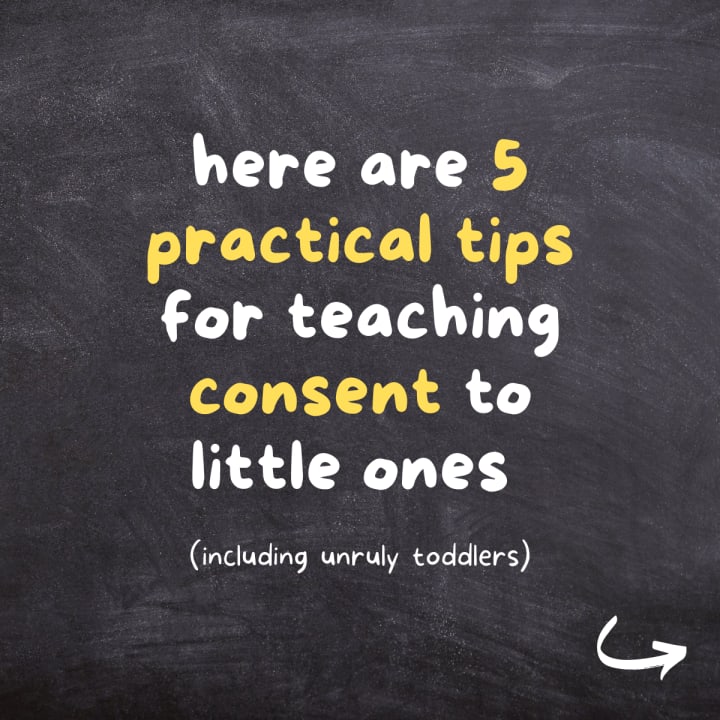
If you implement these tips, I promise you'll end up with a more self-assured, confident, self-loving child who *also* respects the bodies and choices of others.
Here are 5 practical tips you can start using *today* to lay the foundation for a lifetime of respect in your child:
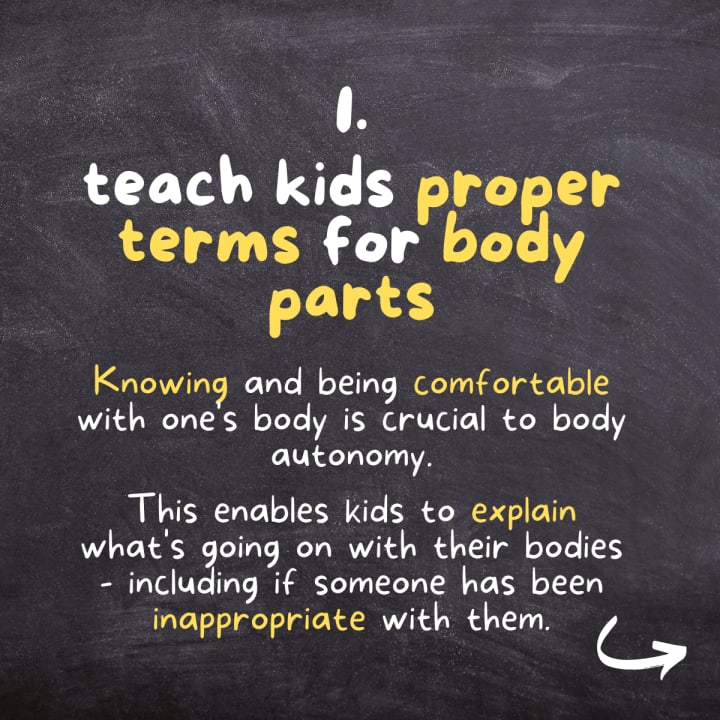
1. Teach kids the medical terms for their body parts.
Bath-time is an especially great place to start. When The Boy is in the bath, we go through the whole list of his body parts; he points to them and can name them with confidence. It's empowering.
What this does is A) lays the foundation for sex education when the time comes and B) enables him to more accurately express what's going on with his body.
One really tragic mistake a lot of parents make is teaching their kids pet names for their private areas instead of the medical terms. Many times, CSA (child sexual abuse) goes undetected because kids express the abuse in a way that the grown-ups around them don't understand. "They touched my taco" vs. "They touched my vagina".
PS. You can also teach your kids proper terms for the functions of their bodies. Male children often get spontaneous erections, to which you can say, "you have an erection" -- without shame or judgment. Knowing what those strange sensations are called empower kids even more to express what's happening with their bodies.
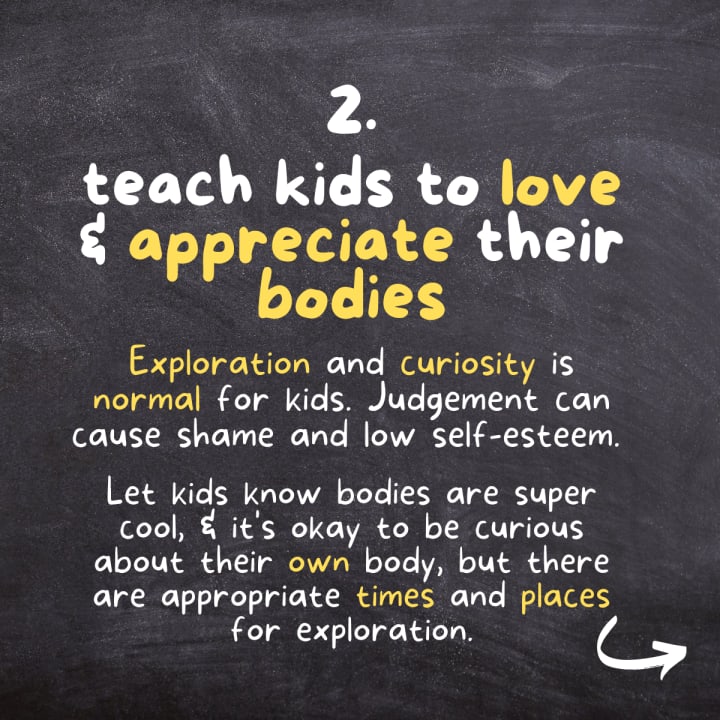
2. Teach kids to love and appreciate their bodies.
This goes beyond "body positivity" you see on Insta. Kids are naturally curious about their bodies and are tactile in nature. They're gonna wanna touch their body parts, other people's body parts, and ask questions.
The way you *react* to this exploration can either foster confidence or shame. If your go-to is "MARK STOP TOUCHING YOUR PENIS AASGJGSRJHSJDHLSJDH!!!" Then Mark is probably going to feel awful for exploring his body (which isn't something he should feel guilty about at all).
Instead, try this: "Mark, I understand your curiosity about your penis, but there are certain times and places where touching yourself is not okay."
Bath and diapering times are my nephew's designated exploration times. We reinforce that his body is beautiful and perfect the way it is. He loves his round belly, his hair, and yes, his privates. If I see he's playing with himself during non-bath and diapering times, I say, "hey buddy, save it for the bath/diaper change."
You can also teach early on that while it's okay to explore your *own* body, it's not okay to touch others without their permission.
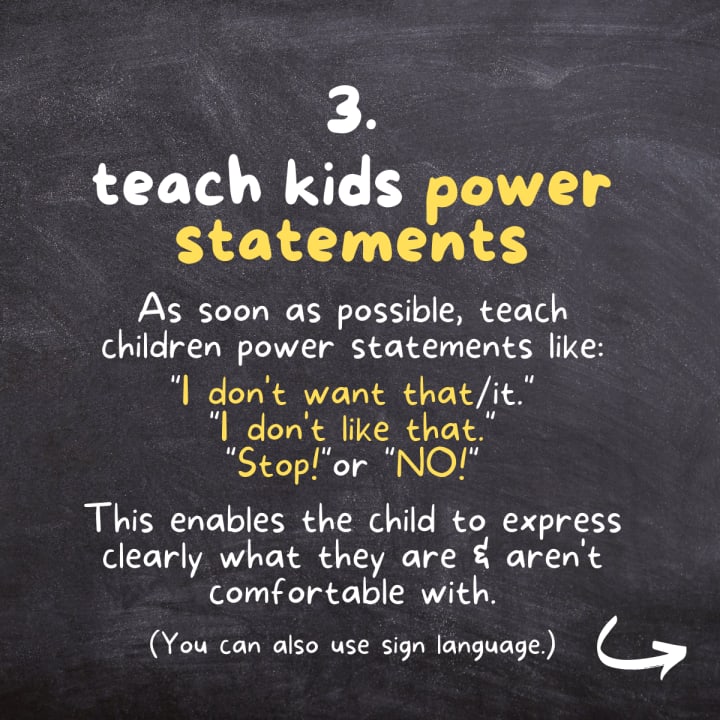
3. Teach kids verbal & signed power statements.
My nephew is confident in saying "I don't like it", "I don't want it", and of course, "NO!" or "No, thank you." We model this for him by using power statements ourselves. He's gotten fairly good at respecting them (most of the time).
Along with this goes the teaching of statements like "more" or "please" so the child can indicate when they *do* want something. Power statements make kids feel in control of their bodies and increase their confidence. Of course, power statements won't be effective unless you...
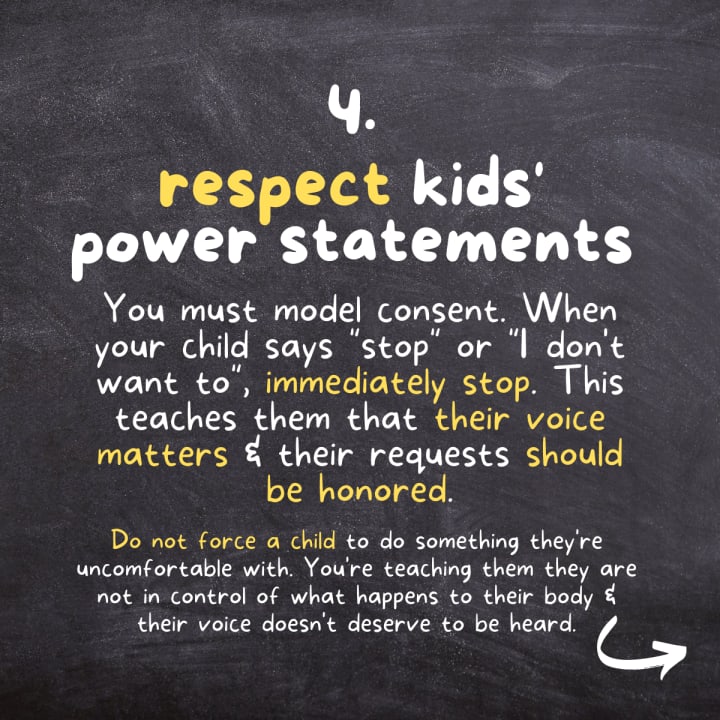
4. Respect a child's power statements.
This includes enforcing their power statements even with family, friends, and of course, strangers.
If your child says, "I don't want to hug Aunt Nancy" DO NOT force them to. What you're communicating to them is their voice doesn't matter, and they are responsible for complying with the physical demands of others -- this is a nightmare for kids once they start dating and modeling unhealthy relationship power dynamics. It also increases their risk of partner and intimacy violence because they may not feel like they're allowed to say "no".
It is your job to enforce your child's "no". I don't care if your salty family and friends don't like it. If you don't stand up for your kid's autonomy, who will?
If I'm tickling my nephew and he says "STOP!" I immediately stop. No ands, ifs, or buts. I'm teaching him that his wishes for his body are to be respected and honored. If he signs "more" or "please" or says something like "tickle tickle" then I know he's giving me permission to continue. This is how consent is modeled for children, no matter how old they are.
Now, you may be thinking "what about when my kid says they don't want to brush their teeth or take a bath or do homework." Yes, lol, that's gonna happen. Here's what to do:
- Immediately stop when you hear the power statement. Take a brief pause from whatever the activity is.
- Ask why they don't want to do the activity. (Perhaps there's something going on you're not aware of). Even if your child is non-verbal or not at speaking age yet, still ask. You're setting an expectation that they will be listened to.
- Calmly and clearly explain that while you respect their desire not to do the activity, it, unfortunately, must be done. (Example: "Man, I know you don't wanna brush your teeth, but we have to brush your teeth so they won't get icky and hurt.")
- Proceed with the activity through support and redirection; when possible, offer a choice. (Example: "Hey, let's brush our teeth so we can go watch PJ Masks!" or "We can brush our teeth now, or we can wait 5 minutes and brush then - which would you like?")
Respecting power statements is all about just that -- empowering kids, teaching them their voice matters and their choices should be respected. There's no better way to teach kids consent than by modeling it ourselves.
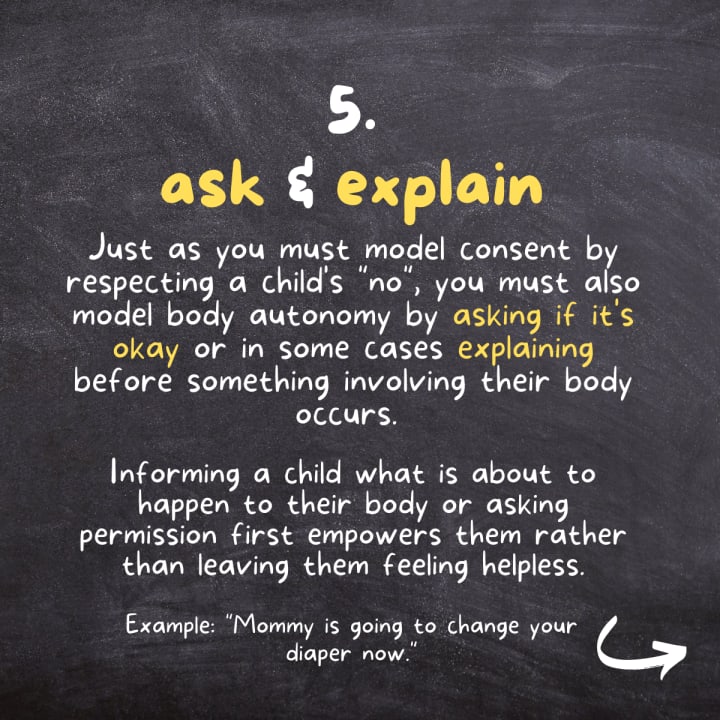
5. Ask and explain what's happening to the child's body.
We began this with my nephew practically from birth.
As a kid, imagine how scary it must be for someone (even if it's a parent) to just randomly walk up to you and start taking off your clothes! Or changing your diaper/pull up, or wiping jelly off your face. If one adult did that to another, it could be considered assault! Yet we treat kids as if they don't have a say about what happens with their own bodies and they're just supposed to roll with it without complaint.
Early and often, explain what's going on with your child's body. This is also a good time to explain "okay" and "not okay" touches.
Examples:
- "Mommy has to put medicine on your bottom - this is an okay touch. It's not okay for someone to touch your bottom without you saying so."
- "The babysitter is going to change your clothes for bedtime. If you are not comfortable with that, please let me know so I can change you before I leave."
- "The doctor is going to look at your private areas to make sure they are healthy. I will be with you the whole time. If you aren't comfortable, please tell me."
Kids should never be excluded from the conversation about their own body, or what happens to it.
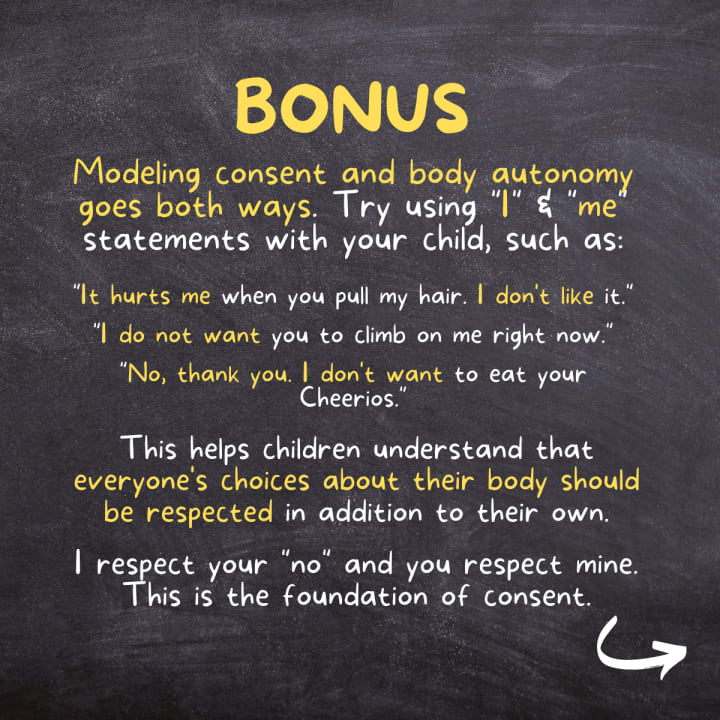
There's no better example or model for consent in your child's life than you. If you're a teacher, coach, or someone who works with kids, you can apply these tips in your classroom, gym, church, etc. The more places and ways kids see consent and body autonomy modeled, the more it is enforced in their minds that *this* is the way it's supposed to be.
Let's create a world where everyone's "no" is respected and heard. You're never too young (or old) to learn.
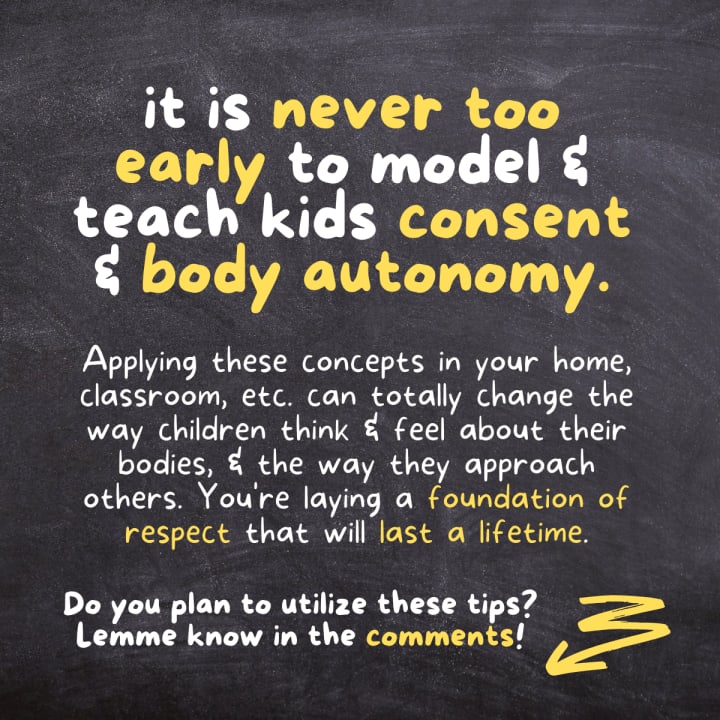
If you follow these tips, you'll be setting the foundation for a lifetime of your child loving, respecting, and appreciating themselves and their body -- as well as others. When consent and body autonomy are modeled for kids, it sets them up to become confident, respectful, empowered adults.
Note: I adapted this article from a post I created for LinkedIn, but if you'd like to chat about this (or anything) you can reach out to me on Twitter, Instagram, or LinkedIn (@JerynCambrah on all platforms). I would love to know if these tips helped you.
About the Creator
Jeryn Cambrah
A neurodivergent writer, content manager, designer, author, poet, and human. Trying to make the world a little bit better -- one word at a time.






Comments
There are no comments for this story
Be the first to respond and start the conversation.